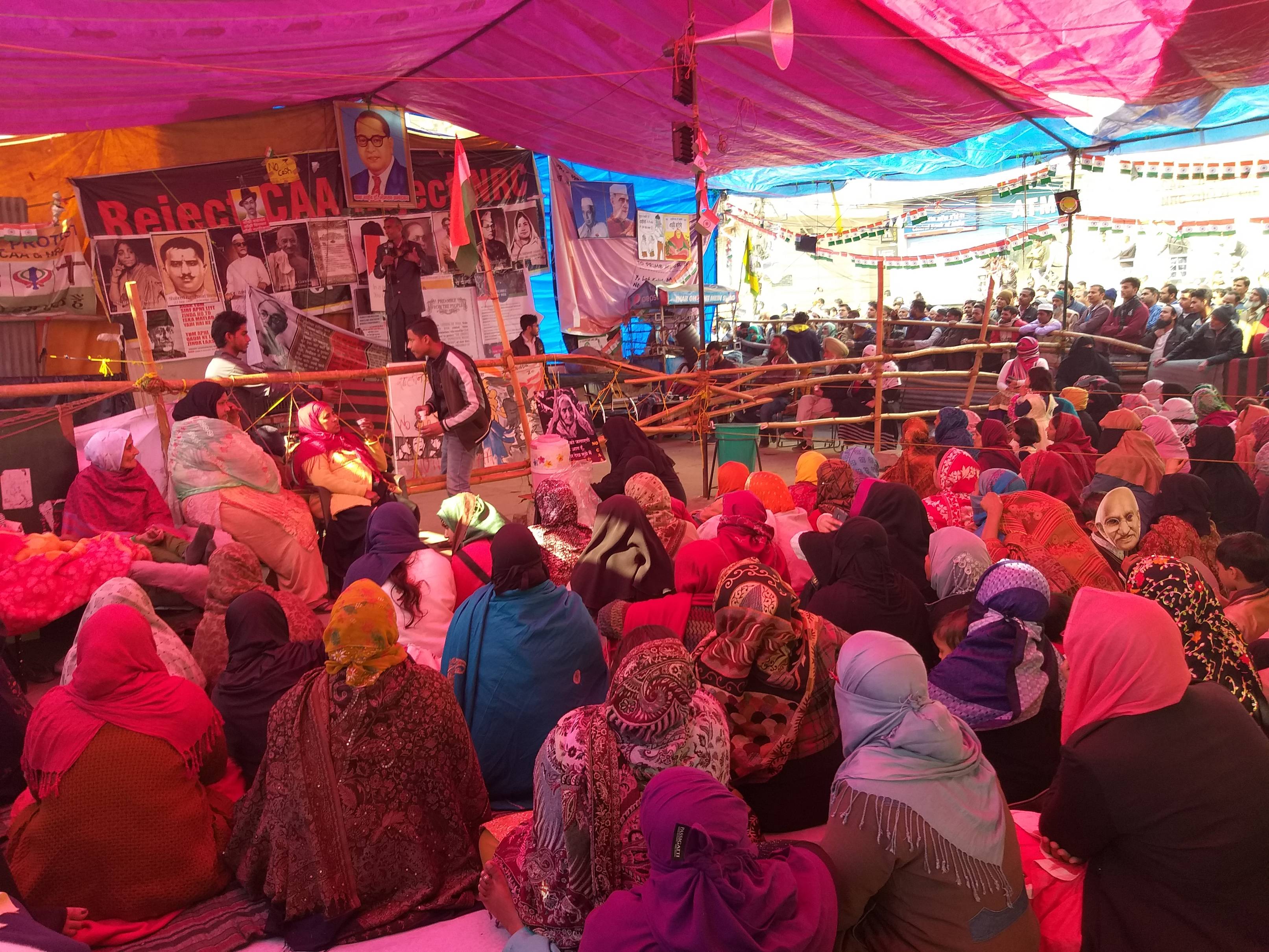
Delhi polls: BJP focuses on Shaheen Bagh, AAP stands by development
Two-year-old Riyaz (name changed on request) dozed off to sleep on his mother’s lap, a little irritated by the bustle around him that was occasionally disrupting his siesta.

Two-year-old Riyaz (name changed on request) dozed off to sleep on his mother’s lap, a little irritated by the bustle around him that was occasionally disrupting his siesta.
For over a month now, this noisy place under a marquee, which blocks a part of the Shaheen Bagh-Kalindi Kunj road, has been his cradle.
His mother is a regular at this protest site, effectively shuffling her role between a woman, a mother, a wife and, a forced activist.
On the far corner in the front, sitting on a crampy cot, an octogenarian “dadi”, wearing a tri-colour wristband, silently counts her prayer beads.
Under this dusty makeshift venue in the middle of the road, they all are trying hard in their own ways to put up a brave face of normalcy in an abnormal surrounding as the ongoing protest against the Citizenship (Amendment) Act (CAA) has overshadowed their other priorities.
Also read: Politicos address rallies, gatherings on last Sunday before Delhi polls
Even the death of a child has failed to deter one of the protesting mothers. Four-month-old Mohammed Jahaan caught a bad cold because of the open tent and died a few days ago, leaving his mother Nazia and father Mohammed Arif of the Batla House area, devastated.
But setting aside this tragedy, Nazia said she would soon join the protest again for the sake of her other two children — a five-year-old daughter and a year-old son.
The constant threat, intimidation, and two instances of gun-wielding youths trying to harm the protesters, have only strengthened their resolve to fight for their rights.
“We will not cow down to submission. We will continue our protest,” said a protesting woman. She, however, refused to divulge her name and be photographed.
As the women dug their heels deeper, the BJP further scaled up its tirade against the anti-CAA protests.
Also read: Barbs fly, speeches get shriller ahead of Delhi Assembly polls
Launching his poll campaign at CBD Ground in East Delhi’s Karkardooma on Monday (February 3), prime minister Narendra Modi claimed that the protests, far from being spontaneous, were rather well-planned experiments to destroy national harmony.
Modi’s barb was in sync with the BJP’s poll strategy in Delhi to whip up the public sentiment against the sit-in at Shaheen Bagh, mainly by frail grandmothers and overworked mothers.
In this highly polarised campaign, local residents rue that real issues like open drainage, problems with potable water, littering of garbage, dilapidated roads, pollution etc. took a back seat in the Muslim-dominated Okhla assembly constituency, of which Shaheen Bagh is a portion.
“Neither the CAA nor our protest has anything to do with the state government. People here should vote after considering issues regarding development such as power, road condition, water, cleanliness, sewers etc,” said Daniyal Ashraf, a student of Jamia Millia Islamia.
Ashraf said the issue of CAA was dragged unnecessarily to influence voters.
Also read: Delhi polls: Social media battle heats up as BJP, Cong try to breach ‘Kejri Wall’
Interestingly, the BJP candidate for the Braham Singh constituency downplays the role of CAA in the coming elections in public, saying his priority would be to resolve issues related to education, health care, sanitation, drinking water and other basic amenities.
As for the CAA, he said his party was trying to allay the fear of voters over the act.
Sources in the BJP, however, said the party’s strategy was to corner a substantial chunk of votes in Hindu pockets of the constituency such as Sarita Vihar, Sukhdev Vihar, Jasola Vihar, some parts of New Friends Colony, Kalindi Kunj etc, by rallying the public’s opinion about the anti-CAA protests. And then hope that in the Muslim majority localities such as Zakir Nagar, Shaheen Bagh, Batla House, Ghaffar Manzil, Johri Farm etc., votes get divided between the AAP and the Congress.
Singh, leader of the Bahujan Samaj Party, defected to the BJP this time, hoping the two-pronged strategy would enable the saffron party to win the seat for the first time. This specific seat is one of the six constituencies in Delhi where Muslims constitute more than 40 per cent of the population.
Singh has a reason to be hopeful after seeing the Congress fielding a heavyweight candidate. The party has fielded Parvez Hashmi, former Rajya Sabha MP and four-time legislator from the constituency.
Also read: Delhi polls: Kejriwal says his aim is to beat corruption, take Delhi forward
The BJP hopes Hashmi will dent the AAP’s Muslim support base in the constituency, which had been won by the party in 2015 by a margin of over 64,000 votes.
The BJP is anticipating that the AAP leader’s refusal to take a firm stand against the CAA would make the Muslim voters drift away from the AAP.
“The BJP is trying to politicise the Shaheen Bagh protest in a bid to divide voters. But I am determined to foil their divisive agenda. I am seeking re-election on the basis of development works I have done in his constituency in the past five years,” said AAP candidate and sitting MLA Amanatullah Khan, who is also the chairperson of the Delhi Waqf Board.
With Shaheen Bagh dominating the political discourse and the routine lives of a majority of voters, the challenge for Okhla residents would be to remain insulated from the all-pervasive CAA and vote on February 8 on normal issues of bijli, pani, sadak (electricity, water, and roads).
Going by the campaign pitch, it is unlikely that the challenge would be overcome. The Shaheen Bagh protestors, however, claimed they would. Will others follow suit?

